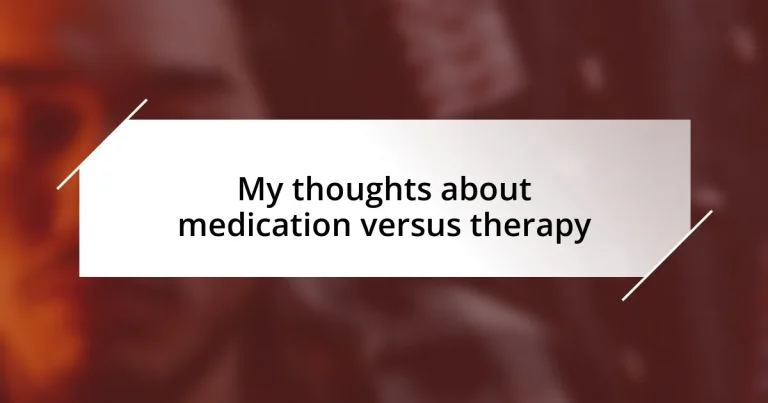Key takeaways:
- Medication offers quick relief and addresses brain chemistry imbalances, while therapy facilitates deeper emotional exploration and personal growth.
- Combining medication and therapy can enhance the healing process by stabilizing mood and enabling more effective emotional processing in therapy.
- Personalizing treatment plans is crucial, as individuals respond differently to therapy and medication, highlighting the importance of tailored approaches.
- Timing is essential; medication may be necessary when symptoms disrupt daily life, whereas therapy can provide support for emotional challenges and relational issues.
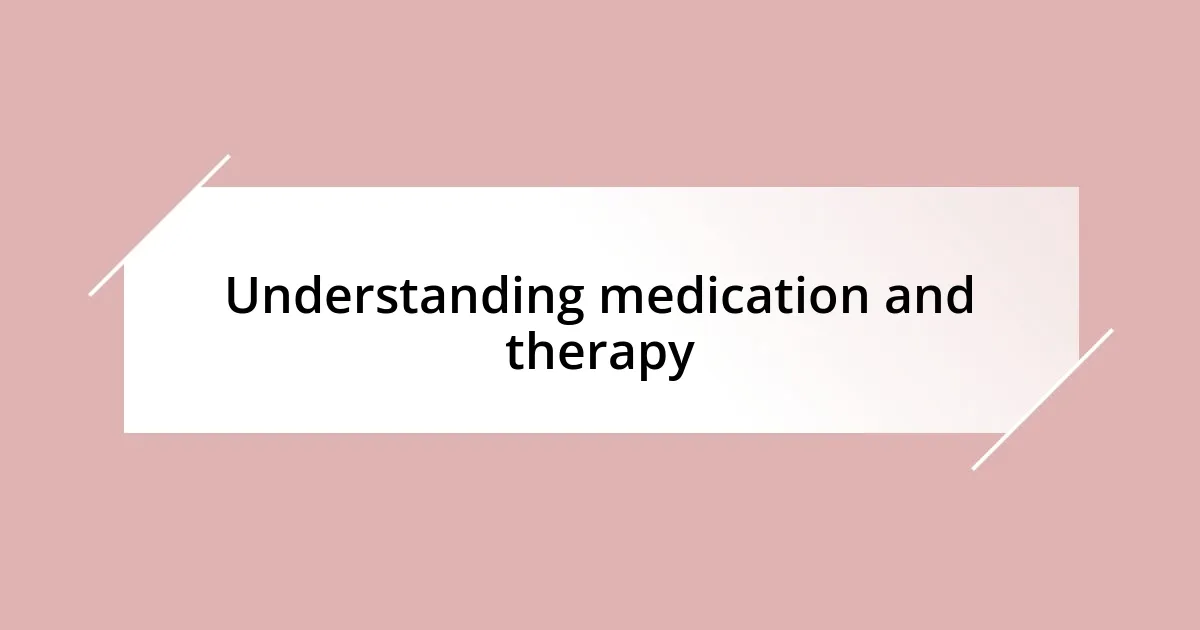
Understanding medication and therapy
When I think about medication and therapy, I often reflect on their distinct yet complementary roles in mental health care. Medication can provide a quicker response, often stabilizing mood or alleviating symptoms in a way that therapy might not achieve immediately. Have you ever felt a sense of relief just from taking that first dose? I remember the first time I started a medication; it felt like a weight lifted, but then I realized that it was only part of the journey.
Therapy, on the other hand, dives deeper into understanding the root causes of our struggles. It’s like peeling back layers of an onion—sometimes it can be fragrant and enlightening, and other times, it can bring tears. I recall a session where I truly confronted my fears about the past; it was tough but transformative. Isn’t it fascinating how grappling with our emotions, while challenging, can lead to profound growth?
Both avenues have their merits and limitations, and the best approach often involves combining them. I find myself questioning what could lead one person to choose medication, while another leans towards therapy. It sparks curiosity about individual experiences and the uniqueness of every journey toward mental well-being. How do you view the balance between these two modalities?
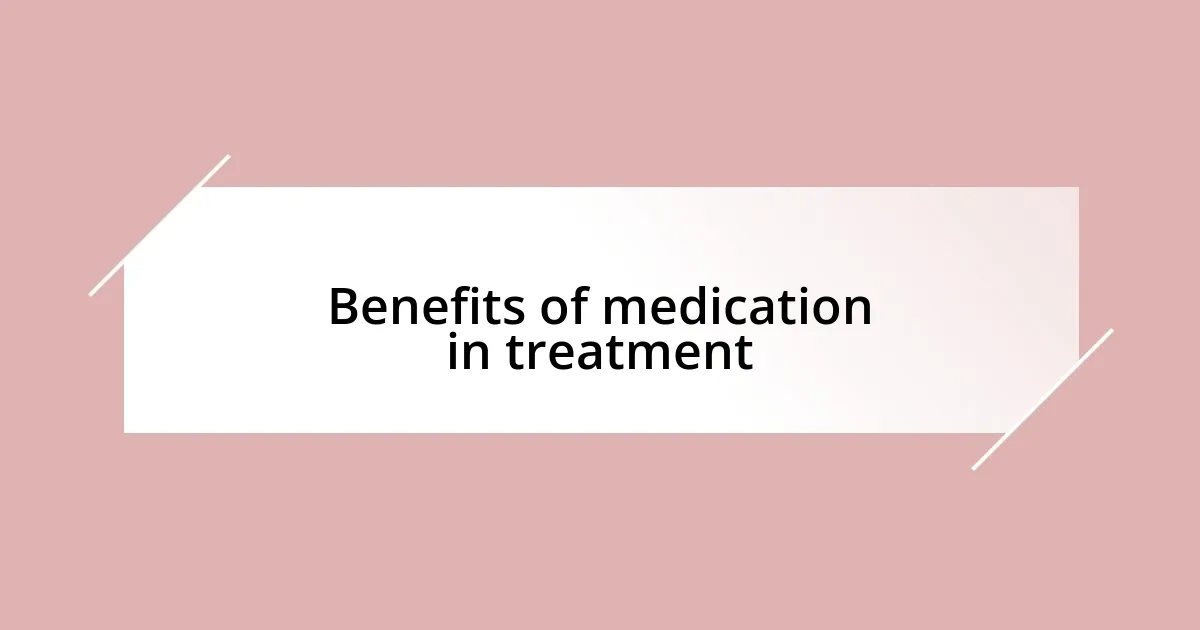
Benefits of medication in treatment
Medication can act swiftly, often bringing relief when symptoms become overwhelming. I recall a period when anxiety paralyzed me. After starting medication, I distinctly felt the fog begin to lift, allowing me to engage in daily activities again. It’s incredible how something so small, like a pill, can restore a sense of normalcy in our lives.
One of the significant benefits of medication is its ability to address imbalances in brain chemistry. For me, learning about neurotransmitters—like serotonin and dopamine—opened my eyes to why I felt the way I did. When these chemicals aren’t in harmony, emotions can swing wildly. By taking medication, I was able to find a balance that allowed me to experience joy again, something I had almost forgotten.
Another point to consider is the empowerment that comes with medication. The decision to start a treatment may feel daunting, but once you see improvements in mood or focus, it can be liberating. It felt like reclaiming a part of myself. Have you ever experienced that? Knowing that medication was working for me motivated me to take steps towards other healing modalities like therapy.
| Benefit of Medication | Personal Insight |
|---|---|
| Quicker Symptom Relief | Lifted my anxiety, allowing engagement in life. |
| Addresses Brain Chemistry Imbalances | Helped restore joy by balancing neurotransmitters. |
| Empowerment in Treatment | Reclaimed my sense of self with visible improvements. |
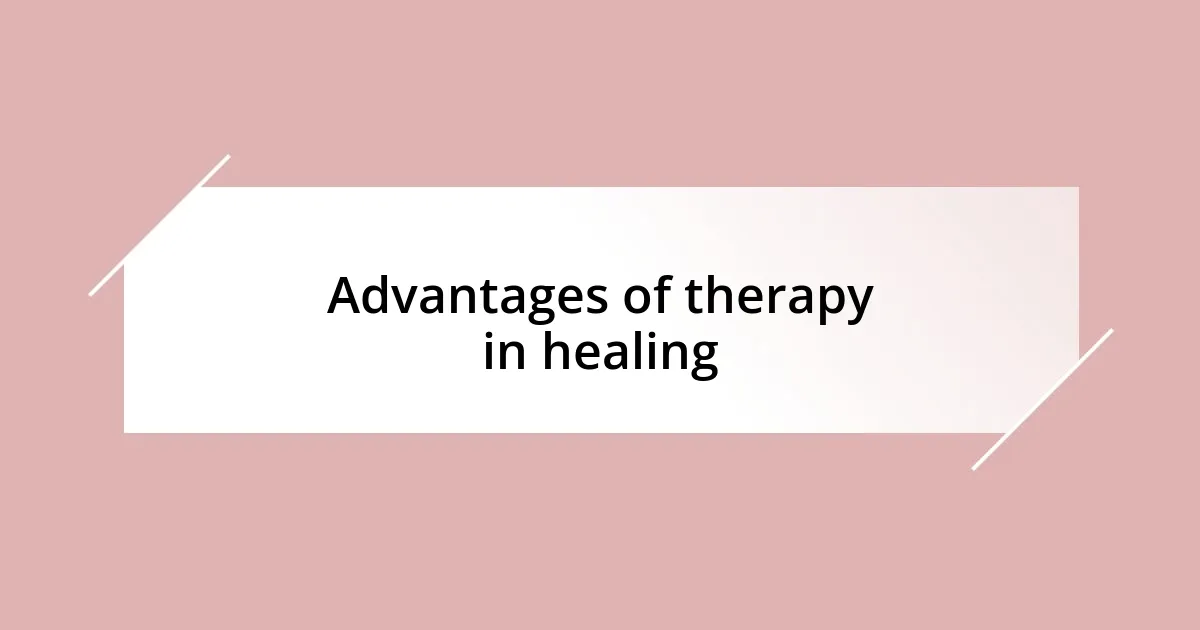
Advantages of therapy in healing
Therapy has a unique way of facilitating healing that goes beyond immediate relief. I remember a pivotal moment in therapy when I unlocked a long-suppressed memory that had been affecting my behavior unknowingly. The exhilaration of uncovering that truth was unlike anything else; it felt like stepping into the light after being in the dark for far too long. Engaging in this type of deep exploration helps us build greater self-awareness, leading to lasting change in our lives.
Here are some advantages of therapy that I’ve found particularly impactful:
- Enhanced Self-Awareness: Therapy encourages us to reflect on our thoughts and feelings, allowing for breakthrough moments that can reshuffle our understanding of ourselves.
- Coping Skills Development: Through different techniques, therapy equips us with tools to manage stress and emotions, empowering us to face challenges head-on.
- Emotional Processing: Talking through experiences helps to process emotions in a safe environment, which can lead to a sense of catharsis and relief.
- Interpersonal Growth: Therapy often strengthens our relationships with others by teaching us effective communication and conflict resolution skills, enhancing our connections.
In my experience, these elements have made therapy an invaluable part of my healing journey. Each session felt like a step forward, no matter how small, and I could feel the weight of past burdens gradually lift.
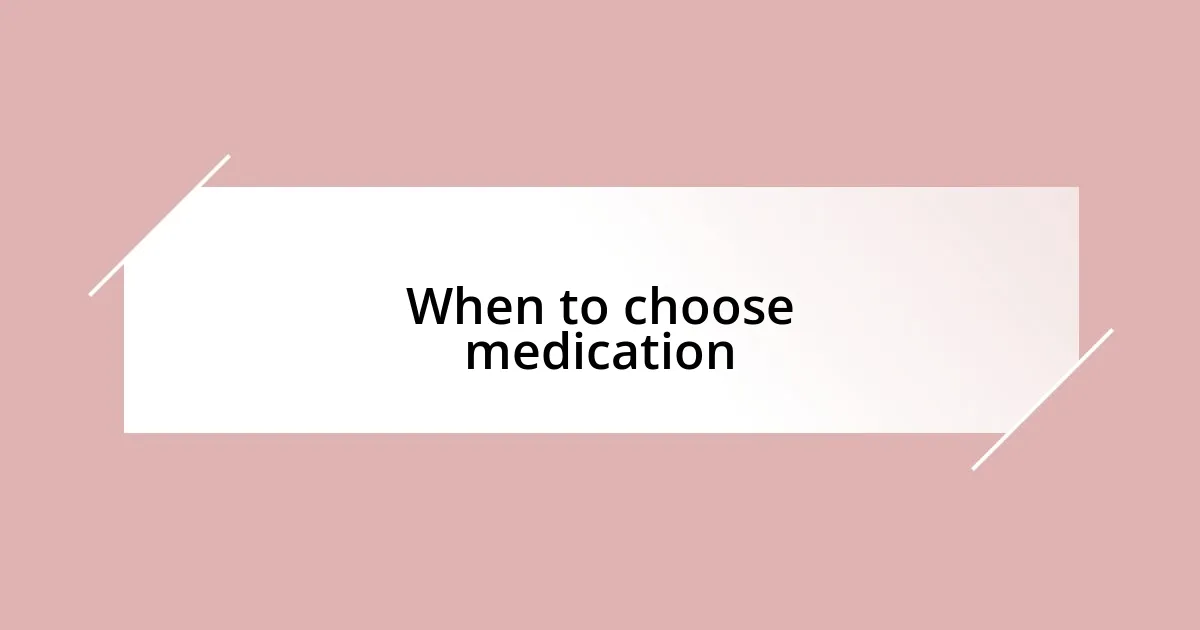
When to choose medication
Choosing medication can often feel like a significant decision, especially when symptoms start to disrupt daily life. I remember the moment I knew I needed more than just willpower—my usual coping strategies weren’t cutting it anymore. It was as if I was riding a rollercoaster of emotions, and medication helped to smooth out those peaks and valleys. Have you felt overwhelmed to the point where you just needed relief? In those moments, medication might be a practical step toward reclaiming stability.
There are instances when medication shines, particularly for conditions like severe depression or anxiety. I experienced firsthand how medication can intervene during moments when my thoughts spiraled into darkness. It was a small change, yet it allowed me to connect with others again and think more clearly about my situation. This immediate support can be crucial in the early stages of treatment, giving us the strength to explore other healing avenues, like therapy.
Timing is also crucial. Medication is often recommended when symptoms become debilitating or hinder everyday functions, like going to work or socializing. I found that after starting medication, my capacity to engage with friends returned, making it easier to seek out therapies and self-help strategies. Isn’t it remarkable how addressing the physical could lead to the psychological? Recognizing when it’s time for medication can truly change the trajectory of healing.
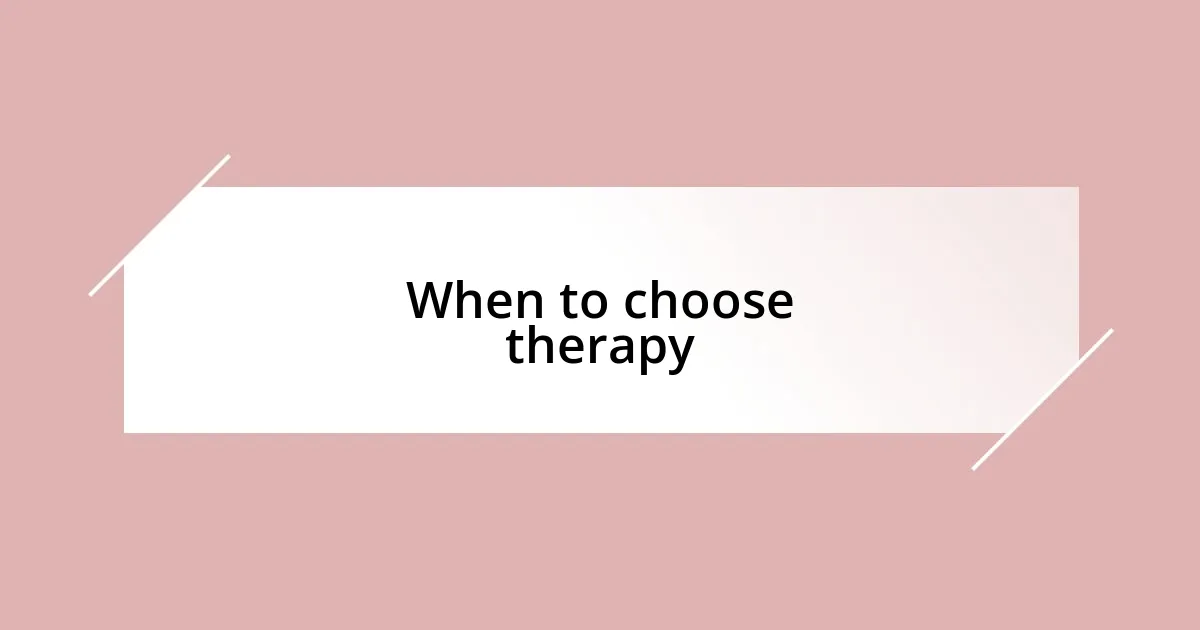
When to choose therapy
Sometimes, the choice to lean into therapy becomes evident when I find myself feeling stuck or overwhelmed. I vividly recall a time when I was caught in a cycle of negative thoughts that seemed impossible to break on my own. In situations like that, therapy offers a lifeline—an opportunity to untangle those thoughts with the guidance of a professional who can provide fresh perspectives.
I also believe therapy shines when I want to dig deeper into my emotional landscape. For instance, a few years ago, I started having panic attacks without any clear cause. It was through therapy that I discovered unprocessed grief lurking beneath the surface. How powerful is it to know that, with the right support, I could face what I had long avoided? This kind of emotional excavation isn’t just healing; it’s transformative.
Moreover, if relationships in my life begin to falter—like when I found myself consistently arguing with a close friend—turning to therapy proved invaluable. I learned how my communication gaps contributed to the friction, and exploring these dynamics in therapy enabled me to navigate our conversations with empathy and understanding. Have you ever had a conflict that seemed insurmountable? Therapy can provide the tools to foster healthier interactions, ultimately paving the way for deeper connections.
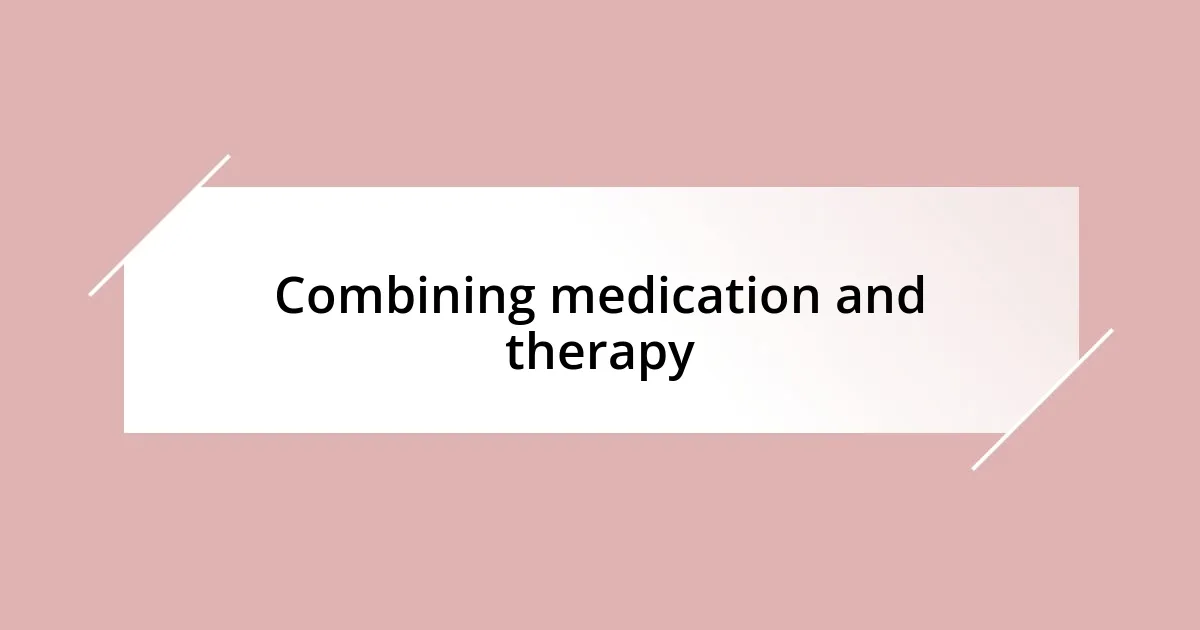
Combining medication and therapy
Combining medication and therapy can often create a powerful synergy in the healing process. When I started both, I noticed that medication helped stabilize my mood, providing a much-needed foundation to build upon. It felt like finally having a safe space to engage in therapy without the overwhelming tide of anxiety crashing over me constantly. Have you ever found that having a bit of control allows you to delve deeper into the issues at hand?
On a personal note, I remember sitting in therapy sessions feeling more open and receptive after my medication began to take effect. The combination allowed me to confront difficult emotions—like guilt and fear of failure—that I had previously avoided. I realized that the clearer headspace medication offered empowered me to tackle layers of emotional complexity in therapy. Isn’t it interesting how we sometimes need that initial boost to face our inner turmoil?
Additionally, I came to appreciate how medication can enhance the therapeutic experience, particularly when facing traumatic memories. One time, while discussing a difficult event that had haunted me, I felt the emotional weight was manageable because my medication had smoothed my emotional edges. This balance made it possible for me to process what I once thought was too painful to revisit. Have you ever noticed how addressing one part of your life can open the door to explore another? It’s this intricate dance between different approaches that can create pathways for lasting change.
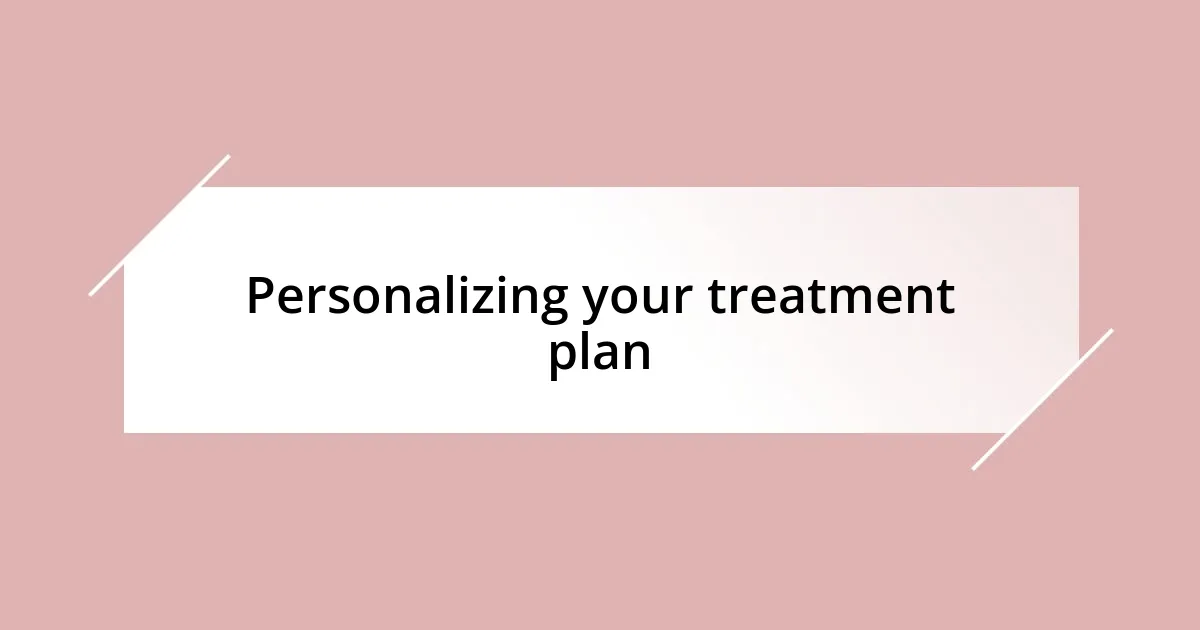
Personalizing your treatment plan
Personalizing a treatment plan is essential because we all respond differently to therapy and medication. I remember the first time I sat down with my doctor to discuss my options. It was enlightening to discover the importance of tailoring my approach to fit my unique needs. Why should we settle for a one-size-fits-all solution when our mental health is so nuanced?
I once had a friend who felt overwhelmed by the prospect of medication. After some conversation and reflection, we realized that her anxiety stemmed from particular life events rather than a chemical imbalance. Together, we explored how therapy might serve her better initially. It was eye-opening to see how understanding individual circumstances can direct us towards the most beneficial treatment path. Isn’t it remarkable how listening to ourselves can lead to finding what truly resonates with our hearts?
Moreover, I’ve found that revisiting and adjusting the treatment plan over time can be game-changing. After a few months of therapy, I engaged in a check-in with my therapist, and we unearthed that my initial goals had shifted. This back-and-forth made me feel empowered and understood. Have you ever revisited an approach that no longer served your evolving self? Embracing these adjustments in treatment allows for continuous growth and healing, keeping the journey both personalized and relevant.












